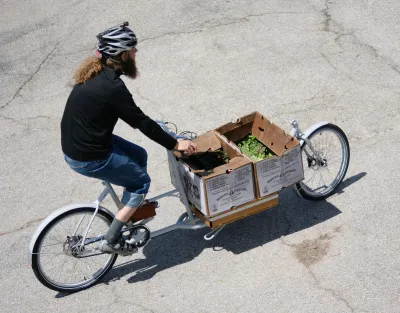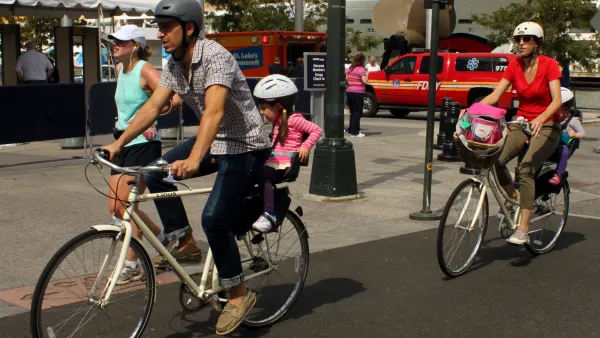Familiar with the perception that bicyclists are generally kids with no money and too much time? Emily Badger discusses the findings of a study that shows riders out-consume drivers over the course of a month for all businesses except grocery stores.

In the bike-friendly city of Portland, the government plans to encourage new riders by extending bicycle infrastructure to neighborhoods farther from the urban center. The problem, says Kelly Clifton, is "[a]s we move out beyond those areas into more auto-oriented areas, we start to see businesses say, 'Hey, wait a minute. You're taking away on-street parking to put in bike lanes, you're taking away the one parking spot in front of my store to put in a bike corral. I don't see many bikers around here. So what does this mean for me?"
For most business owners, drivers make up the majority of all customers. However, a study [pdf] conducted for the Oregon Transportation Research and Education Consortium finds that drivers visit establishments less frequently than cyclists and pedestrians, who make frequent trips and end up spending more over a month. "This finding is logical," says Badger, "It's a lot easier to make an impulse pizza stop if you're passing by an aromatic restaurant on foot or bike instead of in a passing car at 35 miles an hour." This behavior doesn't apply to grocery stores where drivers with their greater trunk capacity outspend other travelers.
For the study, Clifton and colleagues surveyed 1,883 people walking out of convenience stores, restaurants and bars; and another 19,654 out of supermarkets. "There are obviously some other factors at play here," admits Badger. "Families with cars are less likely to eat out than single young professionals on a bike. And we'd all prefer that drivers run up smaller bar tabs than pedestrians." Clifton raises the possibility of the "green dividend," which means that Portland's green infrastructure allows people to save on transportation and direct their money towards other expenses.
FULL STORY: Cyclists and Pedestrians Can End Up Spending More Each Month Than Drivers

Analysis: Cybertruck Fatality Rate Far Exceeds That of Ford Pinto
The Tesla Cybertruck was recalled seven times last year.

National Parks Layoffs Will Cause Communities to Lose Billions
Thousands of essential park workers were laid off this week, just before the busy spring break season.

Retro-silient?: America’s First “Eco-burb,” The Woodlands Turns 50
A master-planned community north of Houston offers lessons on green infrastructure and resilient design, but falls short of its founder’s lofty affordability and walkability goals.

Test News Post 1
This is a summary

Analysis: Cybertruck Fatality Rate Far Exceeds That of Ford Pinto
The Tesla Cybertruck was recalled seven times last year.

Test News Headline 46
Test for the image on the front page.
Urban Design for Planners 1: Software Tools
This six-course series explores essential urban design concepts using open source software and equips planners with the tools they need to participate fully in the urban design process.
Planning for Universal Design
Learn the tools for implementing Universal Design in planning regulations.
EMC Planning Group, Inc.
Planetizen
Planetizen
Mpact (formerly Rail~Volution)
Great Falls Development Authority, Inc.
HUDs Office of Policy Development and Research
NYU Wagner Graduate School of Public Service



























